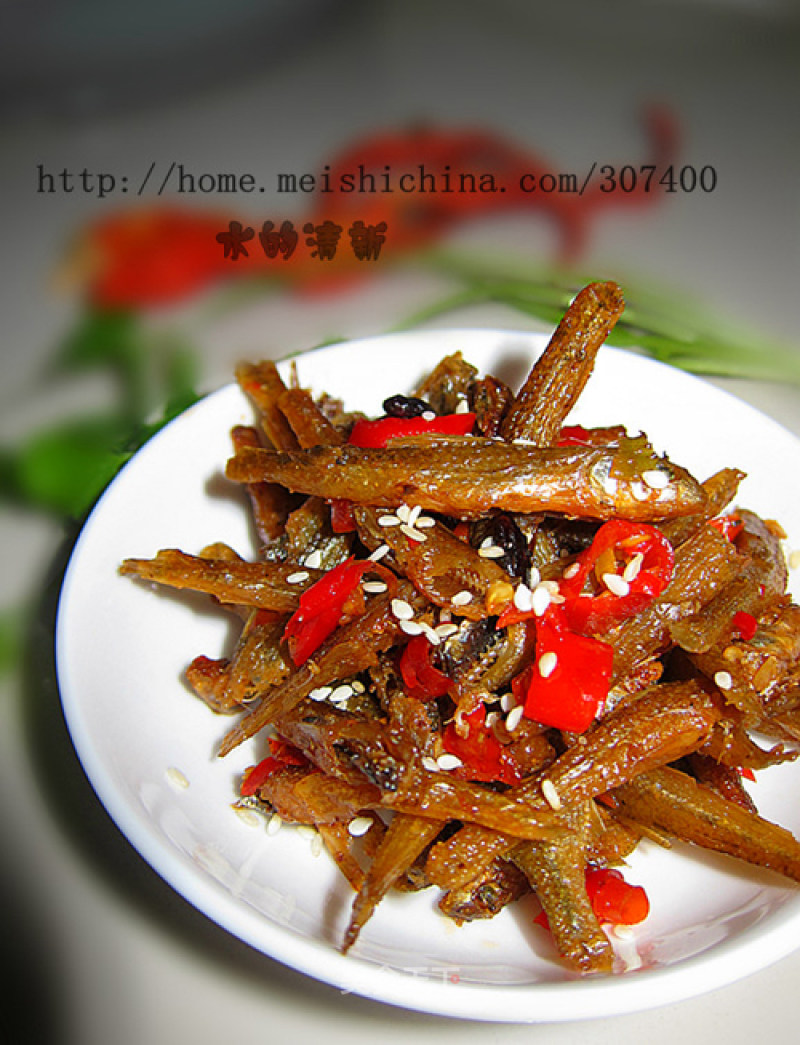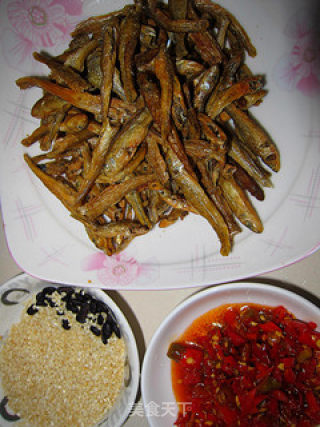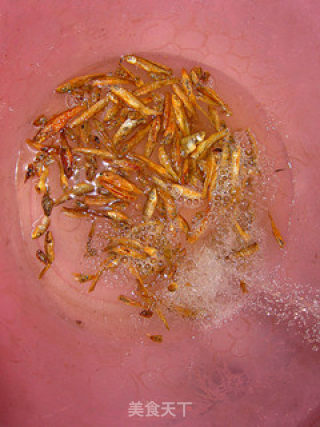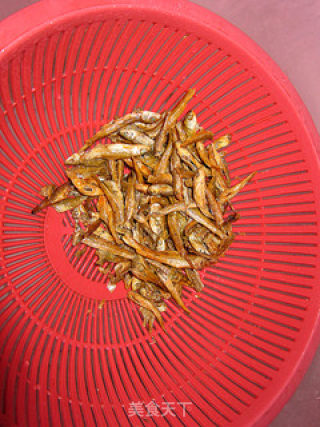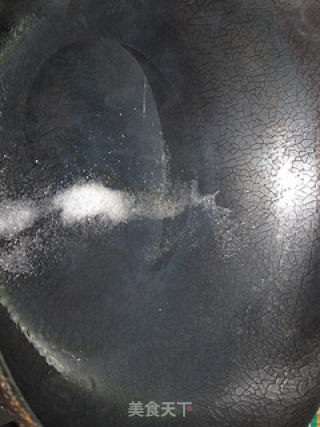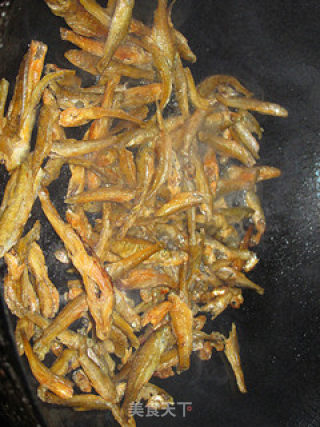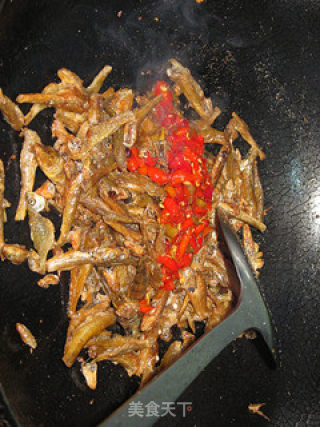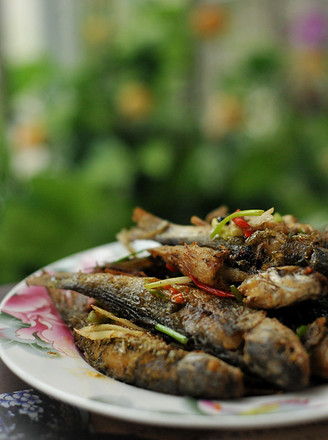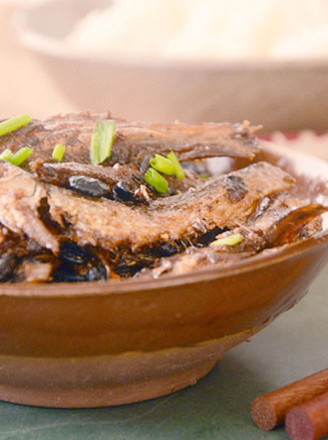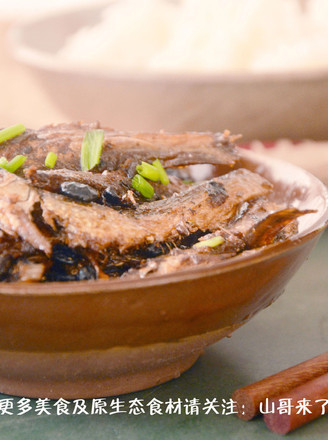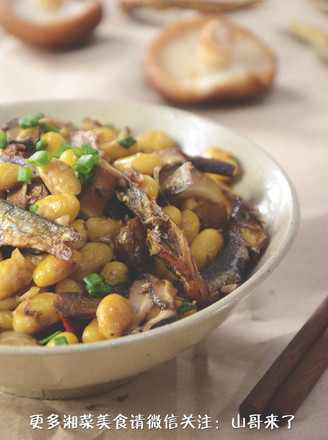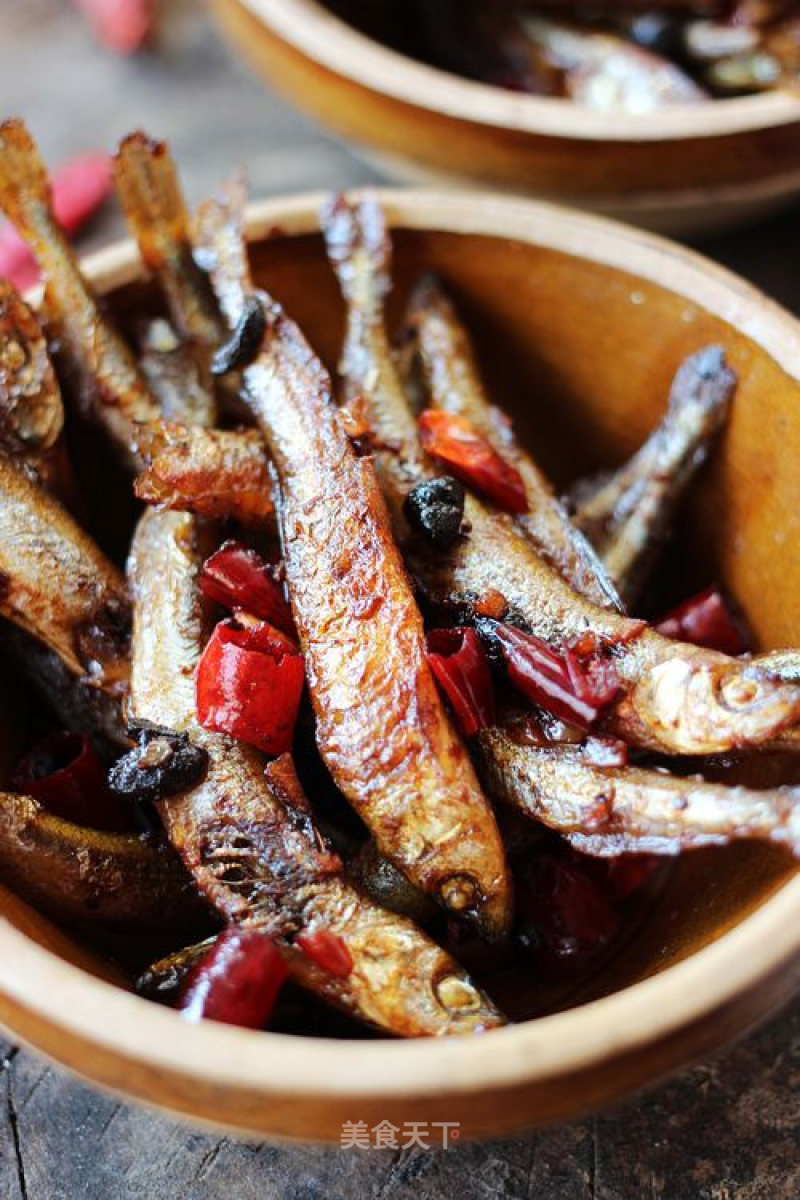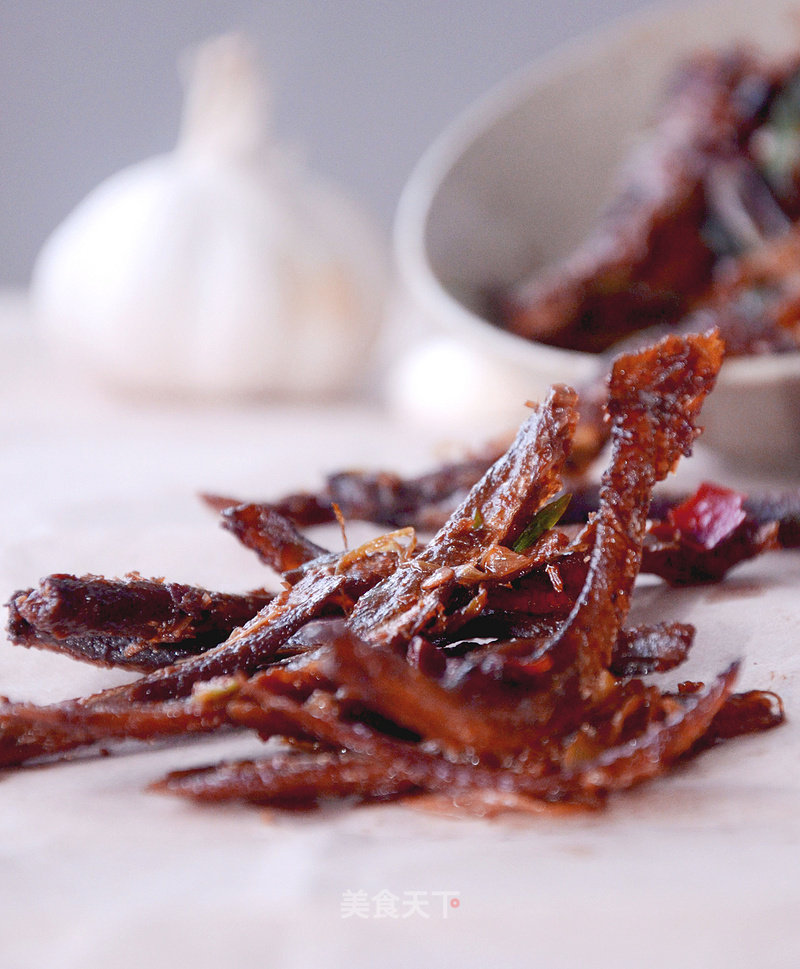Hometown Specialty-crispy Fish with Chopped Peppers
by Freshness of water
Favorite
Difficulty
Easy
Time
10m
Serving
2
The fish I used was brought from my hometown. It is also sold in major cities, but the taste is worlds apart.
Usually this kind of small fish is fished in the river to get rid of the internal organs, spread the oil in an iron pan, then spread the fish on the pan and then slowly dry it and then smoke it. It tastes crispy. . . It's fragrant for dinner. . I like to eat anyway. . Hahahaha. . . In Chairman Mao’s years, his favorite food was braised pork and fire-roasted fish~~! ! ! Now, you can taste this kind of fish in a restaurant called Gangnam Commune. . But it's not really standard taste~!
Autumn and winter are a good time for the weak to nourish. Fish is a good aquatic food for nourishment. It is not only delicious, but also has high nutritional value. Its protein content is twice that of pork, and it is a high-quality protein with a high absorption rate by the human body. Fish is rich in thiamine, riboflavin, niacin, vitamin D and a certain amount of calcium, phosphorus, iron and other minerals. Although the fat content in fish meat is low, the fatty acids in it have been proven to reduce blood sugar, protect the heart and prevent cancer. The vitamin D, calcium, and phosphorus in fish can effectively prevent osteoporosis.
Six groups of people who are not suitable for eating fish
1. Those who take certain drugs: Those who take cough medicine should not eat fish, especially deep-sea fish, so as not to cause histamine allergic reactions, which may cause skin flushing, conjunctival hyperemia, dizziness, rapid heartbeat, urticaria and other uncomfortable symptoms. . Many deep-sea fish contain histamine. Once the amount of histamine in the human body exceeds the standard, the substance will enter the human blood circulation and cause histamine allergic reactions. The reason why eating deep-sea fish usually does not have the above symptoms is because there is a substance in the human intestines, stomach and liver that inhibits histamine activity-monoamine oxidase, which prevents histamine from entering the blood. However, some cough medicines contain monoamine oxidase inhibitors, which can inhibit the secretion of monoamine oxidase from the body's stomach and liver. At this time, eating deep-sea fish is very easy to cause histamine to accumulate in the body. In addition to cough medicines, there are other medicines that can also inhibit monoamine oxidase. Antibacterial drugs, such as furazolidone (such as furazolidone, etc.), ketoconazole, griseofulvin; antihypertensive drugs such as glucagon; selegiline for the treatment of Parkinson; antidepressants such as moclobemide; anti-tumor Drug procarbazine and so on. There are also drugs that can inhibit the action of monoamine oxidase in Chinese medicine, such as velvet antler, hawthorn, and fleece-flower root.
2. Gout patients: because fish contains purines, and gout is caused by the disorder of purine metabolism in the human body.
3. Patients with bleeding disorders: patients with bleeding disorders such as thrombocytopenia, hemophilia, and vitamin K deficiency should eat less or not eat fish, because the eicosapentaenoic acid (EPA) contained in fish meat can inhibit platelet aggregation. Thereby aggravating bleeding symptoms in patients with bleeding disorders. Patients with bleeding disorders should eat more foods rich in vitamin C.
4. Patients with liver cirrhosis: When liver cirrhosis, the body is difficult to produce clotting factors. In addition, low platelets can easily cause bleeding. If you eat sardines, herrings, tuna, etc., which are rich in 20 carbon 5 enoic acid, the condition will deteriorate sharply, as if worse.
5. Tuberculosis patients: If you eat certain fish while taking isoniazid, you are prone to allergic reactions, such as nausea, headache, skin flushing, conjunctival hyperemia, etc. in mild cases, palpitations, lip and facial swelling, skin rash, diarrhea, and abdominal pain in severe cases. , Difficulty breathing, elevated blood pressure, and even hypertensive crisis and cerebral hemorrhage.
6. Pregnant women: pregnant women should not eat marine fish frequently. They often eat marine products and will consume too much methylmercury. The higher the mercury exposure of the fetus in the uterus, the greater the risk of slight delays in the development of other functions such as attention, memory, and language skills. Big. Scientists also reminded that even if the mother does not take much mercury, the brain development of the fetus may be delayed. For this reason, pregnant women and breast-feeding women should eat less seafood, up to 1 to 2 times a week, less than 100 grams each time, and do not eat tuna, swordfish and other marine fish with high mercury content. You can choose to eat seafood that is not contaminated by mercury. Fish farmed in ponds. "
Usually this kind of small fish is fished in the river to get rid of the internal organs, spread the oil in an iron pan, then spread the fish on the pan and then slowly dry it and then smoke it. It tastes crispy. . . It's fragrant for dinner. . I like to eat anyway. . Hahahaha. . . In Chairman Mao’s years, his favorite food was braised pork and fire-roasted fish~~! ! ! Now, you can taste this kind of fish in a restaurant called Gangnam Commune. . But it's not really standard taste~!
Autumn and winter are a good time for the weak to nourish. Fish is a good aquatic food for nourishment. It is not only delicious, but also has high nutritional value. Its protein content is twice that of pork, and it is a high-quality protein with a high absorption rate by the human body. Fish is rich in thiamine, riboflavin, niacin, vitamin D and a certain amount of calcium, phosphorus, iron and other minerals. Although the fat content in fish meat is low, the fatty acids in it have been proven to reduce blood sugar, protect the heart and prevent cancer. The vitamin D, calcium, and phosphorus in fish can effectively prevent osteoporosis.
Six groups of people who are not suitable for eating fish
1. Those who take certain drugs: Those who take cough medicine should not eat fish, especially deep-sea fish, so as not to cause histamine allergic reactions, which may cause skin flushing, conjunctival hyperemia, dizziness, rapid heartbeat, urticaria and other uncomfortable symptoms. . Many deep-sea fish contain histamine. Once the amount of histamine in the human body exceeds the standard, the substance will enter the human blood circulation and cause histamine allergic reactions. The reason why eating deep-sea fish usually does not have the above symptoms is because there is a substance in the human intestines, stomach and liver that inhibits histamine activity-monoamine oxidase, which prevents histamine from entering the blood. However, some cough medicines contain monoamine oxidase inhibitors, which can inhibit the secretion of monoamine oxidase from the body's stomach and liver. At this time, eating deep-sea fish is very easy to cause histamine to accumulate in the body. In addition to cough medicines, there are other medicines that can also inhibit monoamine oxidase. Antibacterial drugs, such as furazolidone (such as furazolidone, etc.), ketoconazole, griseofulvin; antihypertensive drugs such as glucagon; selegiline for the treatment of Parkinson; antidepressants such as moclobemide; anti-tumor Drug procarbazine and so on. There are also drugs that can inhibit the action of monoamine oxidase in Chinese medicine, such as velvet antler, hawthorn, and fleece-flower root.
2. Gout patients: because fish contains purines, and gout is caused by the disorder of purine metabolism in the human body.
3. Patients with bleeding disorders: patients with bleeding disorders such as thrombocytopenia, hemophilia, and vitamin K deficiency should eat less or not eat fish, because the eicosapentaenoic acid (EPA) contained in fish meat can inhibit platelet aggregation. Thereby aggravating bleeding symptoms in patients with bleeding disorders. Patients with bleeding disorders should eat more foods rich in vitamin C.
4. Patients with liver cirrhosis: When liver cirrhosis, the body is difficult to produce clotting factors. In addition, low platelets can easily cause bleeding. If you eat sardines, herrings, tuna, etc., which are rich in 20 carbon 5 enoic acid, the condition will deteriorate sharply, as if worse.
5. Tuberculosis patients: If you eat certain fish while taking isoniazid, you are prone to allergic reactions, such as nausea, headache, skin flushing, conjunctival hyperemia, etc. in mild cases, palpitations, lip and facial swelling, skin rash, diarrhea, and abdominal pain in severe cases. , Difficulty breathing, elevated blood pressure, and even hypertensive crisis and cerebral hemorrhage.
6. Pregnant women: pregnant women should not eat marine fish frequently. They often eat marine products and will consume too much methylmercury. The higher the mercury exposure of the fetus in the uterus, the greater the risk of slight delays in the development of other functions such as attention, memory, and language skills. Big. Scientists also reminded that even if the mother does not take much mercury, the brain development of the fetus may be delayed. For this reason, pregnant women and breast-feeding women should eat less seafood, up to 1 to 2 times a week, less than 100 grams each time, and do not eat tuna, swordfish and other marine fish with high mercury content. You can choose to eat seafood that is not contaminated by mercury. Fish farmed in ponds. "

